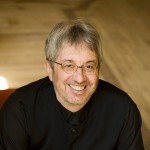May 23-24, 2012: Spektral Quartet and High Concept Laboratories Present Theatre of War
On Wednesday, May 23 in Chicago, the Spektral Quartet and High Concept Laboratories will present Theatre of War, an artistic investigation into the disconnects between the experiences of those most directly affected by our wars and the experience of the public at large. The event comes at a salient moment, immediately following the NATO summit meeting in Chicago. Theatre of War will be held at the Chopin Theatre and will be repeated on Thursday, May 24. All ticket proceeds are being donated to the Vet Art Project (www.vetartproject.com)
In every era there are artists who are able to use their work as a prism through which the public can examine troubling facts that might otherwise be hiding in plain sight. Examples abound, as diverse as Picasso’s antiwar masterpiece Guernica and Nina Simone’s civil rights broadside Mississippi Goddam. With our personal history in the struggles for civil rights and against the War in Vietnam, we consider this an important role of art. We have been troubled by the lack of public discourse and artistic light shone on a decade of US war-making.
We applaud the Spektral Quartet and their collaborators for embracing this artistic tradition with Theatre of War. The multimedia production will employ music, film, literature, and theater to examine the consequences of our nation being at war. With our modern all-volunteer military, few Americans are directly involved in our war efforts. We as a society hold those who serve in high regard. But we tend to do so with an empty reverence. We worship them as heroes without really understanding what we ask them to do in our names, nor comprehending the physical and psychic toll they pay in doing it. These are the disconcerting realities Theatre of War will confront.
The musical components of Theatre of War will be “Stress Position” by Chicago composer Drew Baker and George Crumb’s “Black Angels.” Guest pianist Lisa Kaplan of eighth blackbird will perform “Stress Position,” a staged piece for solo amplified piano. The pianist is subjected to a kind of torture, stretched to the limits to play constantly at the two extremes of the keyboard. As the volume increases and the lights go out, the audience is engulfed in the experience. The Spektral Quartet will play “Black Angels,” written by Crumb at the height of the Vietnam War turmoil. It is scored for electrified string quartet and the players are also required to vocalize, play percussion, and bow water-filled crystal glasses, creating eerie, otherworldly effects.
Richard Mosse, a filmmaker and photographer who has been embedded with US military units in Iraq and Afghanistan, will provide the video portion of the program. His short films “Theatre of War,” “Gaza Pastoral,” and “Killcam” expose elements of our military efforts of which the everyday public are typically unaware.
The literary and theatrical segments of Theatre of War will come from Nobel laureate Wislawa Szymborska and Chicago writer Virginia Konchan. Szymborska’s poems “Hatred” and “The End and the Beginning” assay the fundamental nature of human conflict and reconciliation. Konchan’s short story “Blackbird,” adapted for the stage by Molly Feingold of High Concept Laboratories, probes the scars of war borne by a returning soldier and his frustrated search for healing.
In presenting Theatre of War in the wake of the NATO Summit, we hope the Spektral Quartet and their artistic partners will spark a personal-level examination of our ongoing global military operations. Following the program, the audience will be encouraged to share their reactions in discussion with the artists and with each other.
Chicago-based Spektral Quartet was formed in 2010 with a commitment to play a wide-ranging repertory in traditional and genre-breaking venues. The members are Aurelien Fort Pederzoli (violin), J. Austin Wulliman (violin), Doyle Armbrust (viola), and Russell Rolen (cello). High Concept Laboratories, led by Co-artistic Directors Molly Feingold and Kevin Simmons, collaborates with Chicago-area artists and performers to foster the creation and development of new works.
Theatre of War
Chopin Theatre
1543 W Division
Chicago, IL 60642
Wednesday, May 23, 2012 at 7:30 PM
Thursday, May 24, 2012 at 7:30 PM
General Admission: $30.00
Student Admission: $20.00
Tickets: http://www.brownpapertickets.com/event/242801
Arlene and Larry Dunn are avid fans of a wide range of contemporary arts and music endeavors as well as life-long social activists. They are frequent contributors of “audience perspective” blog postings for digitICE, the blog of the new music juggernaut International Contemporary Ensemble. They live in rural LaPorte County, Indiana.


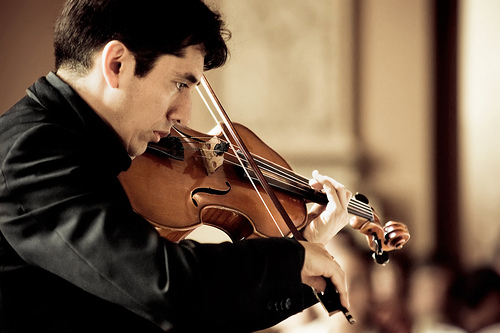
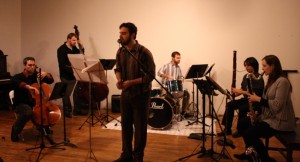
 Our friends at
Our friends at 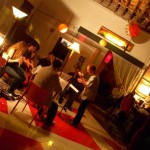 I thought it might be nice to close out the month of interviews from Chicago by featuring a couple musicians from
I thought it might be nice to close out the month of interviews from Chicago by featuring a couple musicians from 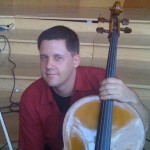 Last week on the podcast: Cliff Colnot (download Cliff’s interview
Last week on the podcast: Cliff Colnot (download Cliff’s interview 